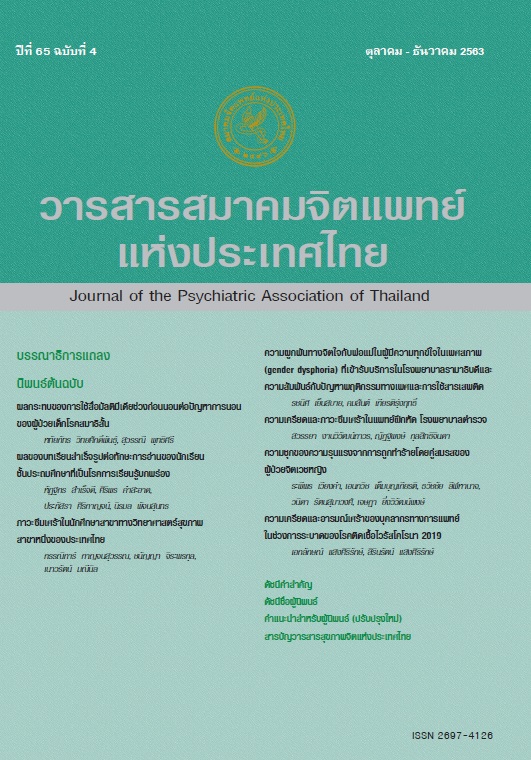Impact of Multimedia Use Before Bed on Sleep problems in ADHD Children
Main Article Content
Abstract
Objective: To examine the impact of multimedia use before bed on sleep problems in ADHD children.
Methods: A cross-sectional descriptive study was conducted in ADHD children aged 6-8 years at child and adolescent psychiatry clinic, Ramathibodi hospital. Primary physicians completed medical profiles and parents completed measures of multimedia use, sleep hygiene, and Children’s Sleep Habit Questionnaire-Thai version.
Results: Of the total 80 children, 63.7% were male, the mean age was 7.33 years. 93.8% had sleep problems and the mean total CSHQ score was 49.20. A greater number of media devices in child’s bedroom was significantly associated with increased night waking problem subscore and the more time use in playing games before bed was significantly associated with increased sleep duration problem subscore; meanwhile, the time for other purposes of media use was not significantly associated with any sleep problem subscores. Furthermore, after controlling the effect of ADHD severity, playing games before bed was still significantly associated with increased sleep duration problem subscore. However, having parental guidance while the child was on multimedia was significantly associated with decreased sleep onset delay problem subscore.
Conclusion: The more time use in playing games before bed was significantly associated with increased sleep duration problem subscore and a greater number of media devices in the child’s bedroom was significantly associated with increased night waking problem subscore. However, having parental guidance while the child was on multimedia was significantly associated with decreased sleep onset delay problem subscore.
Article Details
Articles submitted for consideration must not have been previously published or accepted for publication in any other journal, and must not be under review by any other journal.
References
2. Council on Communications and Media. Media Use in School-Aged Children and Adolescents. Pediatrics. 2016;138(5):1-6.
3. Fuller C, Lehman E, Hicks S, Novick M. Bedtime Use of Technology and Associated Sleep Problems in Children. Global Pediatric Health. 2017; 4:1-8.
4. Chiraphadhanakul K, Jaimchariyatam N, Pruksananonda C, Chonchaiya W. Increased Sleep Disturbances in Thai Children With Attention-Deficit Hyperactivity Disorder Compared With Typically Developing Children. Behavioral Sleep Medicine. 2015;14(6):677-686.
5. Hosiri T, Punyapas S, Sawangsri W. The Prevalence and Patterns of Sleep Problem in Children with ADHD. J Med Assoc Thai 2018; 101; Suppl. 1: S34-S40.
6. Cortese S, Brown TE, Corkum P, Gruber R, O'Brien LM, Stein M, et al. Assessment and management of sleep problems in youths with attention-deficit/hyperactivity disorder. J Am Acad Child Adolesc Psychiatry. 2013;52(8):784-96.
7. Spruyt K, Gozal D. Sleep disturbances in children with attention-deficit/hyperactivity disorder. Expert Rev Neurother. 2011;11(4):565-77.
8. Weiss MD, Baer S, Allan BA, Saran K, Schibuk H. The screens culture: impact on ADHD. Atten Defic Hyperact Disord. 2011;3(4):327-34.
9. Becker S, Lienesch J. Nighttime media use in adolescents with ADHD: links to sleep problems and internalizing symptoms. Sleep Medicine. 2018;51:171-178.
10. Vaidyanathan S, Shah H, Gayal T. Sleep Disturbances in Children with Attention - Deficit/Hyperactivity Disorder (ADHD): Comparative Study with Healthy Siblings. J Can Acad Child Adolesc Psychiatry. 2016;25(3):145-51.
11. Cain N, Gradisar M. Electronic media use and sleep in school-aged children and adolescents: A review. Sleep Med. 2010;11(8):735-42.
12. Tahkamo L, Partonen T, Pesonen AK. Systematic review of light exposure impact on human circadian rhythm. Chronobiol Int. 2019;36(2):151-70.
13. Wajszilber D, Santiseban JA, Gruber R. Sleep disorders in patients with ADHD: impact and management challenges. Nat Sci Sleep. 2018;10:453-80.


